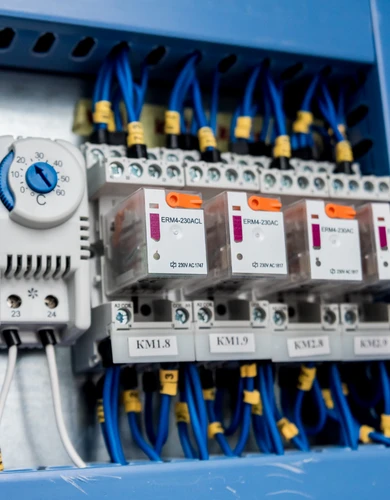What is a letter of authority?
A Letter of Authority (LOA) grants permission to a third-party intermediary to act on your behalf regarding your energy contracts.
💡A Third Party Intermediary (TPI) in business energy is an independent entity, like an energy broker, that acts as a middleman between energy suppliers and businesses.
In this guide, we explain what an LOA can and cannot do and how it is used by business energy brokers.
Contents:
- Why do energy brokers ask you to sign an LOA?
- Why is it important for your business to sign an LOA?
- What is the process after you have signed your LOA?
- A business energy LOA template
What is an LOA?
There are two types of Letters of Authority in business energy: Level 1 and Level 2. Below, we detail the differences between them.
Level 1 LOA
A Level 1 Letter of Authority (LOA) lets a business energy broker access your business energy usage and contract details but not sign contracts for you.
With a Level 1 LOA, energy brokers can:
- Access current and historical account info.
- Issue termination notices.
- Get data from industry databases.
- Negotiate prices.
- Handle communications and
- Resolve business energy objections
With a level 1 LOA, you always make the final contract decisions. This LOA is ideal for businesses using a business energy comparison service without losing control.
Level 2 LOA – renewal
A Level 2 LOA grants an energy broker more extensive powers than a Level 1 LOA.
Specifically, a Level 2 LOA allows the broker to:
- Access all current and historical account information.
- Issue termination notices and handle contract renewals.
- Obtain information from third-party databases.
- Negotiate and sign business energy contracts on your behalf.
- Manage billing and authorise adjustments and refunds, and
- Submit business energy VAT declarations.
This type of LOA is helpful for businesses that prefer fully outsourced management of their energy contracts. It gives their broker full authority to make binding decisions.
An important factor to consider if you are signing a Level 2 LOA is that the third party can not only arrange and sign contracts on your behalf but also handle your contract renewals without notifying you. This gives them significant control over your energy agreements, so it’s crucial to fully trust the third party and clearly understand the extent of their authority before signing.
💡 Business Energy Deals does not recommend signing a Level 2 LOA due to the significant control it grants your energy brokers, given the expensive exit fees on business energy contracts.
Who can sign an LOA?
Who can sign a Letter of Authority (LOA) depends on your business type and structure:
- Sole Traders: The business owner is the authorised signatory. Sole traders have complete control over their business decisions and operations.
- Partnerships: Any partner in the business can sign the LOA. All partners should agree to sign it, especially for significant authorisations like a Level 2 LOA.
- Limited Companies: A company director is typically the authorised signatory. In some cases, other senior managers, such as the company secretary, finance controller, or facilities manager, can also sign the LOA.
- Public Limited Companies (PLCs): Similar to limited companies, a director or other senior official designated as an authorised signatory can sign the LOA.
- Non-Profit Organisations: An executive director, chairman, or other senior official with the authority to make decisions on behalf of the organisation can sign the LOA.
How long is a Letter of Authority valid?
A Level 1 LOA is typically valid for 12 months, but you can request that your broker adjust the validity period to better suit your needs.
Although a Level 2 LOA is also generally valid for 12 months, it often includes a clause that permits the broker to sign renewal contracts on your behalf, effectively extending the authorisation beyond the initial 12-month period for contract renewals.
Why do energy brokers ask you to sign an LOA?
A business energy broker requires an LOA because business energy suppliers and business gas suppliers need this document to confirm the broker has explicit permission to act on your behalf. This ensures transparency and compliance with Ofgem’s industry regulations.
Is it safe to sign the LOA?
Yes, it is generally safe to sign a Letter of Authority (LOA), but it is important to take a few precautions:
- Read Carefully: Understand all terms before signing.
- Trustworthy Broker: Choose a reputable broker.
- Scope of Authority: Know what permissions you’re granting.
- Validity Period: Check the duration and adjust if needed.
- Legal Advice: Consult a lawyer if unsure.
Following these steps, you can safely sign an LOA and manage your energy contracts effectively.
Why is it important for your business to sign an LOA?
Signing an LOA is important for your business for several reasons:
- Get Better Deals: An LOA lets brokers access your energy data and negotiate the best business electricity prices and commercial gas rates.
- Save Time: Brokers handle comparisons and contracts, freeing you to focus on your business.
- Leverage Expertise: Brokers use their market knowledge to secure better deals.
- Ensure Compliance: An LOA keeps actions authorised and transparent, meeting industry standards.
Signing an LOA empowers your broker, saves time and money, and ensures compliance and transparency.
What is the process after you have signed your LOA?
Once you sign the LOA, your business energy broker will:
- Negotiate Best Prices: Contact energy suppliers to secure the best deals, allowing you to compare business electricity prices easily.
- Present Options: Offer you the best contract options to choose from.
- Finalise Contract: Provide a paper contract to sign or complete a verbal agreement with you.
- Submit Contract: Send the signed contract to the business energy supplier.
- Handle Objections: Resolve any issues that arise during the process.
- Provide Updates: Keep you informed on the progress.
- Confirm Go-Live: Notify you once your contract is live.
For more information on the process, visit our full guide to switching business energy suppliers.
Business energy LOA template
The below template shows the typical form of a Letter of Authority (LOA).
Please note that different business energy brokers may use slightly different versions of this LOA, so always read it carefully before signing.
Standard business energy LOA template:
[Your company details]
I confirm that [Broker’s legal name] is acting on my behalf, and I authorise the energy supplier to action my account with them as follows:
[Delete permissions as appropriate]
Level 1 business energy broker permissions:
- Request and receive current and historical account information, including consumption history, supply numbers, pricing details, and contract end dates.
- Issue termination notice about existing supply contracts/opt-out from future automatic contract renewals on my behalf.
- Obtain information from third-party industry databases, e.g. metering details.
- The Energy Supplier or TPI to be able to contact my supplier to resolve any objections or rejections regarding my transfer.
- Request and negotiate prices on my behalf.
Level 2 business energy broker permissions:
All the items set out in Level 1, as well as the following:
- Authorise any adjustments, refunds or billing.
- Agree to supply contracts on my behalf.
- Authorise the completion and submission of VAT declarations.
Terms of letter of authority
This letter of authority shall remain valid for one year from the date of signature or the length of the attached contract.
[Company authorised signatory]

